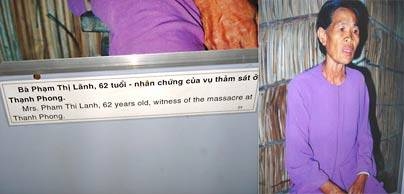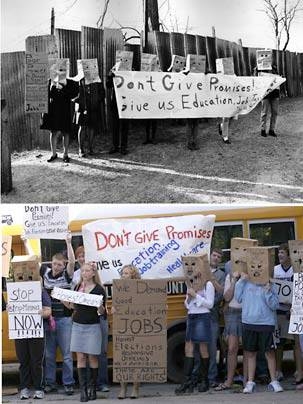Two current exhibits at the Center for Advanced Visual Studies revisit the late 1960s, using forms of re-enactment to pose hard questions about the world today.
Artist Harrell Fletcher's work, "The American War," re-creates exhibits on view at the War Remnants Museum in Ho Chi Minh City. While on a trip to Vietnam for an artists' retreat in 2005, Fletcher photographed each image and text description with a digital camera.
He then printed the images onto large sheets of photographic paper to convey the experience of seeing them in their original configurations.
Although most of the pictures had been published in magazines such as Life and Time and were familiar to the artist, Fletcher says that seeing them all together and presented from the Vietnamese perspective was very striking.
"It made me realize that I didn't know much about the details of the war that had consumed the U.S. for most of my early childhood," he wrote.
Fletcher encourages everyone to do his or her own research about what he calls "The American War in Vietnam ��� and all of the other American wars that have been happening ever since, sometimes covertly and other times, as in the current situation in Iraq, very overtly, but hidden at the same time."
The other exhibit now on view re-creates Robert F. Kennedy's 1968 "poverty tour" through southeastern Kentucky. Performer, director, activist and artist John Malpede has re-created the event, employing installations and temporary site-specific public art.
Set against the backdrop of the Bush-Kerry presidential campaigns, "RFK in EKY 2004" demonstrates how social policies of the 1960s and today connect.
"Many of the concerns of 1968 are present today in recognizable and unrecognizable fashion," Malpede said. "In 1968 hunger was an issue, today poor diet is registered in extremely high levels of obesity, diabetes, heart disease and cancer. Even the war issue -- guns vs. butter -- is uncannily present."
Both exhibitions are on view through Friday, June 30, at the Center for Advanced Visual Studies (CAVS), Room N52-390, weekdays from 9 a.m. to 5 p.m.
Also on view at the CAVS is footage from the two artists' April 28 "Come Together" event, which featured short talks on the relationship at MIT between social responsibility and science and technology.
Participants included Linguistics Professor Noam Chomsky, Architecture Lecturer Julia Scher, Whitaker Professor Emeritus Robert Mann and representatives from MIT's Technology and Culture Forum; the Program in Science, Technology and Society; the Department of Materials Science and Engineering; the Computer Science and Artificial Intelligence Lab; the MIT Museum; the Media Lab; the Program in Human Rights and Justice, and others.
For more information, call x2-2484 or visit cavs.mit.edu.
Ursula August contributed to this report.







